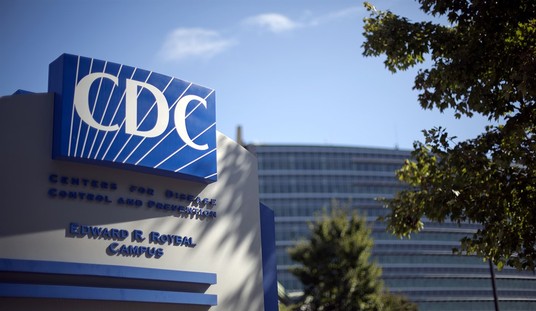Picture this: You’re driving across the Mojave Desert and your car breaks down. You left your phone at the hotel, so you can’t call for help. You have a bottle of water, and you think you’re nearing the end of the desert, so you get out of the car and start walking. After a few miles you’re exhausted, sunburnt, and sick. Just then a car pulls up, and big man gets out and says, “Hi, I’m from the government, and I’m here to help.”
You’re overjoyed. At this point, the behemoth government worker climbs onto your back and demands that you keep walking. There’s not much you can do, since he’s from the government and you’re not. So you walk, or rather stagger, onward. After a while, he says, “I’m thirsty.” You hand him your water bottle. He drinks from it, then keeps it. Finally, you muster the courage to ask, “Why am I carrying you and giving you my water when you had a car?” The government worker says, “I ran out of gas. Lucky for you it happened just when I found you. Keep walking.”
I spin this little yarn to illustrate a real-life story to which folks are just beginning to awaken. Most government workers in your state, county, and local municipality participate in a “defined benefit” pension plan. That means that your tax dollars get used to make sure that, whatever happens in the stock market, the government employee gets a guaranteed payout at retirement.
Here’s a practical example from Lehigh County, Pennsylvania, where I’m running for county executive. Because the markets started to tank in 2008, Lehigh County taxpayers involuntarily kicked in an extra $4 million in 2009 to make sure that government retirees get their guaranteed outcome. The market got worse, so next year, taxpayers will contribute an additional $12 million to cover stock market losses in the pension fund. That amount equals more than 11 percent of the locally raised portion of the county budget. There’s no telling how much more the fund will need in 2011, and the reserves which the county executive used to cover the losses this year will be drained dry in 2010.
Now, unless you work for the government, you probably have your retirement money in something like a 401(k) or IRA which has no such guaranteed result. You may have a “defined contribution” plan, meaning your employer has agreed to set aside part of your compensation for retirement, shielding you from current income taxes. No one knows how much of a payout you’ll get in your sunset years.
So, when the markets are down, your retirement account gets hammered. But the government worker, who rides on your back through this financial desert, has no worries. He’ll still get what was promised him at retirement.
You might wonder who struck this deal on your behalf, since it’s destined to increase your liabilities at a time when you can least afford it.
Well, say thank you to the state and local career politicians, many of whom were elected with support of labor unions. Once in office, they go through the motions of negotiating with these same bargaining units on your behalf. But which side of the table are they really on? Do you think, for example, that the county executive in Lehigh County, who has received some $75,700 in campaign contributions from union political action committees, is the best agent to drive a hard bargain with union bosses who are essentially part of his reelection campaign?
Go to your county budget hearings and listen to the outcry from government employees and union bosses if your elected officials even try to reduce the rate of increase in their pay … and this at a time when many local companies are doing layoffs, pay cuts, and other sorts of downsizing efforts in order to weather the economic storm.
Last week, I listened in shock as a union boss stood up in a public meeting and threatened the Lehigh County commissioners with more grievance filings (an expensive process) if they did anything to jeopardize the harmonious relationship the union has with the county executive whom they helped to elect. In brief, he was saying, “Increase our pay, or we’ll make trouble every day.”
I almost laughed out loud when several government workers suggested that the county would “lose good people to the private sector” if the proposed pay hike didn’t remain part of the 2010 budget.
Imagine if a county commissioner had mustered the nerve to say: “If any government employee can do better in the private sector, let her go. After all, we need smart, hardworking folks in local companies, since the private sector is the only source of prosperity for our local economy.”
But, of course, no one said that. They just voted down each attempt to trim the budget proposal, which is currently some $19 million out of balance. So, government workers will get a pay hike in 2010, during what our president calls “the worst economic crisis since the Great Depression.” They’ll also get an average of $5,500 extra per government employee placed in their retirement fund so their defined benefit payout is secure.
However, the benefit plans, designed to keep government workers on a smooth upward path while you and I ride the roller coaster, are about to run out of gas in the middle of a fiscal desert.
According a story in the Sunday Washington Post, “Steep Losses Pose Crisis for Pensions“:
The upheaval on Wall Street has deluged public pension systems with losses that government officials and consultants increasingly say are insurmountable unless pension managers fundamentally rethink how they pay out benefits or make money or both.
The Post gives examples of the looming crisis from California and New Mexico, to Virginia, Maryland, and Pennsylvania. Some fund managers, desperate to make up for whopping losses, have returned to the risky behaviors which contributed to the crisis in the first place. The story concludes by noting that the Ohio public school teachers’ pension system was 41 years behind schedule in funding its existing obligations. That was before the current economic downturn. The most recent annual report gives a new estimate of how long it would take Ohio to get the fund back on track. According to experts, the estimate is “infinity.”
So, what’s the solution to this huge unfunded liability that could literally bankrupt cities, counties, states, and the taxpayers who support them?
Common sense would dictate that when projected expenses outstrip projected revenues you can either decrease the former, increase the latter, or do some combination of both. But as the Washington Post story points out, those options don’t solve the long-term problem: elected officials have made promises that can’t be kept except under the bluest of blue-sky projections.
The only long-term viable alternative would be to get governments out of the business of managing retirement accounts. In my humble opinion, here’s how that might be accomplished:
1) Newly hired government workers can receive either a portable defined contribution retirement plan — a 401(k) for example — or none at all. In the latter case, we simply pay them a market wage and allow them to handle their own retirement planning. No waiting to become “vested” in the plan. Your money is yours from the start. (Of course, union leaders will complain that many workers aren’t qualified to handle such a responsibility — planning their own financial futures. But remember, these are the same bright and industrious government workers who we have to continually bribe to keep them from jumping to the private sector. As you know, anyone can hire a financial planner for a modest fee.)
2) All legacy government workers could remain in the defined benefit system, but their accumulated nest egg could be progressively transferred into their own accounts. They could then choose the amount of risk with which they feel comfortable based on their projected proximity to retirement.
Your local government may have to borrow money to make these payouts, since many pension funds may soon be insolvent. In the long term, the added debt will be more manageable, and less long-lasting, than the old defined benefit pension obligations.
There is no way forward without pain. There is a way forward without catastrophe, which lays a foundation for fiscal responsibility, but it requires courage.
Of course, we could simply allow these pension funds to go into insolvency, in which case, the federal government would step in and bail them out, taking over their management. But if anyone thinks that the federal government will have more success than your state or county in managing these funds, I have a bridge in the Mojave Desert that I’d like to sell him.









Join the conversation as a VIP Member